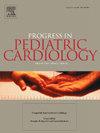获得性心脏病儿童的学习成绩
IF 0.6
Q4 PEDIATRICS
引用次数: 0
摘要
患有先天性心脏病(CHD)的儿童在学校表现方面面临许多挑战;然而,没有研究调查过患有获得性心脏病(AHD)儿童的学习表现。目的评价AHD患儿的学业表现,并将其与冠心病患儿和无冠心病患儿的成绩进行比较。方法采用2020-2022年全国儿童健康调查数据库对6-17岁在校生进行识别。在调查时,照护者报告的心脏病分为先天性和后天两类。结果包括学校缺勤、学校参与、学校报告的问题和特殊教育安置。基于符合纳入标准的87,730名儿童的样本,我们估计2.1%患有冠心病,0.3%患有心脏功能障碍,97.6%没有心脏疾病。与冠心病儿童相比,adhd儿童在学校缺勤、学校参与和学校报告问题方面的比例相当。与没有心脏病的儿童相比,多动症与较高的缺勤率相关(OR: 4.55;95% ci: 2.49, 8.30;p & lt;0.001)和学校报告的问题(OR: 1.98;95% ci: 1.17, 2.22;p = 0.011)。结论:与无心脏病的同龄人相比,adhd儿童与冠心病儿童面临相似的教育挑战。量身定制的学术干预可能需要更好地支持adhd儿童。本文章由计算机程序翻译,如有差异,请以英文原文为准。
School performance in children with acquired heart disease
Background
Children with congenital heart diseases (CHD) experience many challenges to school performance; however, no study has examined school performance in children with acquired heart diseases (AHD).
Objective
To evaluate school performance among children with AHD and compare their outcomes to peers with CHD and peers without heart disease.
Methods
We used the 2020–2022 National Survey of Children's Health database to identify children aged 6–17 years who were enrolled in school. Caregiver-reported heart conditions present at the time of the survey were classified as congenital or acquired. Outcomes included school absenteeism, school engagement, school-reported problems, and special education placement.
Results
Based on a sample of 87,730 children meeting inclusion criteria, we estimated 2.1 % had CHD, 0.3 % had AHD, and 97.6 % did not have a heart condition. Children with AHD exhibited comparable rates of school absenteeism, school engagement, and school-reported problems as children with CHD. Compared to children with no heart disease, AHD was associated with higher odds of school absenteeism (OR: 4.55; 95 % CI: 2.49, 8.30; p < 0.001) and school-reported problems (OR: 1.98; 95 % CI: 1.17, 2.22; p = 0.011).
Conclusion
Children with AHD face similar educational challenges as those with CHD when compared to peers without current heart conditions. Tailored academic interventions may be needed to better support children with AHD.
求助全文
通过发布文献求助,成功后即可免费获取论文全文。
去求助
来源期刊

PROGRESS IN PEDIATRIC CARDIOLOGY
PEDIATRICS-
CiteScore
0.90
自引率
11.10%
发文量
69
审稿时长
75 days
期刊介绍:
Progress in Pediatric Cardiology is an international journal of review presenting information and experienced opinion of importance in the understanding and management of cardiovascular diseases in children. Each issue is prepared by one or more Guest Editors and reviews a single subject, allowing for comprehensive presentations of complex, multifaceted or rapidly changing topics of clinical and investigative interest.
 求助内容:
求助内容: 应助结果提醒方式:
应助结果提醒方式:


